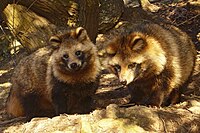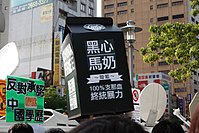
Melamine is an organic compound with the formula C3H6N6. This white solid is a trimer of cyanamide, with a 1,3,5-triazine skeleton. Like cyanamide, it contains 66% nitrogen by mass, and its derivatives have fire-retardant properties due to its release of nitrogen gas when burned or charred. Melamine can be combined with formaldehyde and other agents to produce melamine resins. Such resins are characteristically durable thermosetting plastic used in high pressure decorative laminates such as Formica, melamine dinnerware including cooking utensils, plates, plastic products, laminate flooring, and dry erase boards. Melamine foam is used as insulation, soundproofing material and in polymeric cleaning products, such as Magic Eraser.

Fonterra Co-operative Group Limited is a New Zealand multinational publicly traded dairy co-operative owned by New Zealand farmers. The company is responsible for approximately 30% of the world's dairy exports and with revenue exceeding NZ $22 billion, making it New Zealand's largest company. It is the sixth-largest dairy company in the world as of 2022, as well as the largest in the Southern Hemisphere.

White Rabbit Creamy Candy is a brand of milk candy manufactured by Shanghai Guan Sheng Yuan Food, Ltd., in China. It is an iconic cultural brand and has been in production since 1943. White Rabbit candy is part of the childhood memories of many mainlanders and Hong Kongers, and has been featured in many classic Chinese movies and TV series.
Inner Mongolia Mengniu Dairy (Group) Limited by Share Ltd. is a Chinese manufacturing and distribution company of dairy products and ice cream. The company is headquartered in Hohhot, Inner Mongolia and manufactures dairy products under the Mengniu brand.
Beginning in March 2007, there was a widespread recall of many brands of cat and dog foods due to contamination with melamine and cyanuric acid. The recalls in North America, Europe, and South Africa came in response to reports of kidney failure in pets. Initially, the recalls were associated with the consumption of mostly wet pet foods made with wheat gluten from a single Chinese company.
This timeline of the 2007 pet food recalls documents how events related to the 2007 pet food recalls unfolded. Several contaminated Chinese vegetable proteins were used by pet food makers in North America, Europe and South Africa, leading to kidney failure in animals fed the contaminated food. Both the centralization of the pet food industry and the speed and manner of the industry and government response became the subjects of critical discussion.
In China, the adulteration and contamination of several food and feed ingredients with inexpensive melamine and other compounds, such as cyanuric acid, ammeline and ammelide, are common practice. These adulterants can be used to inflate the apparent protein content of products, so that inexpensive ingredients can pass for more expensive, concentrated proteins. Melamine by itself has not been thought to be very toxic to animals or humans except possibly in very high concentrations, but the combination of melamine and cyanuric acid has been implicated in kidney failure. Reports that cyanuric acid may be an independently and potentially widely used adulterant in China have heightened concerns for both animal and human health.
In 2007, a series of product recalls and import bans were imposed by the product safety institutions of the United States, Canada, Western Europe, Australia, and New Zealand against products manufactured in and exported from the mainland of the People's Republic of China (PRC) because of numerous alleged consumer safety issues. The many product recalls within the year led Consumer Reports and other observers to dub 2007 "The Year of the Recall.”
Li Changjiang was minister and Chinese Communist Party (CCP) party chief of the General Administration of Quality Supervision, Inspection and Quarantine of the People's Republic of China (AQSIQ).
Sanlu Group CO., Ltd. (SJZSGCZ) was a Chinese dairy products company based in Xinhua District, Shijiazhuang, the capital city of Hebei. It produced one of the oldest and most popular brands of infant formula in China. New Zealand's Fonterra owned 43% of Sanlu.

The 2008 Chinese milk scandal was a significant food safety incident in China. The scandal involved Sanlu Group's milk and infant formula along with other food materials and components being adulterated with the chemical melamine, which resulted in kidney stones and other kidney damage in infants. The chemical was used to increase the nitrogen content of diluted milk, giving it the appearance of higher protein content in order to pass quality control testing. 300,000 affected children were identified, among which 54,000 were hospitalized, according to the latest report in January 2009. The deaths of six babies were officially concluded to be related to the contaminated milk.
Sanyuan Group is a state-owned group of companies based on agriculture and animal husbandry in China. It consists of 12 state farms, 20 professional companies, 41 transnational joint ventures, 3 overseas subsidiaries and 1 public company as Beijing Sanyuan Foods, which is listed in Shanghai Stock Exchange.
Hanwei Group is a company based in Dalian, China. It is China's biggest producer of eggs. In October 2008, it became embroiled in a scandal involving traces of melamine being found in its eggs.

Food safety incidents in China have received increased international media scrutiny following the reform and opening of the country, and its joining the World Trade Organization. Urban areas have become more aware of food safety as their incomes rise. Food safety agencies in China have overlapping duties. The 2008 Chinese milk scandal and COVID-19 pandemic received the most attention among food safety incidents.
Zhao Lianhai (赵连海) is a Chinese dissident and former food safety worker who became an activist for parents of children harmed during the 2008 Chinese milk scandal. In 2010 he was sentenced to 2+1⁄2 years imprisonment for 'disturbing social order'.
Food safety incidents in Taiwan have received international media scrutiny.
In 2013, a wide-scale recall of products sold by dairy producer Fonterra was announced after suspected botulism-causing bacteria were found during safety tests. The contaminated whey products had been sold to third parties who use it to produce infant formula and sports drinks. Approximately 1,000 tonnes of consumer product was affected by the recall across seven countries, but no cases of sickened consumers were reported. China, which imports most of its powdered milk from New Zealand, instituted a temporary ban on the import of the ingredient from New Zealand.








